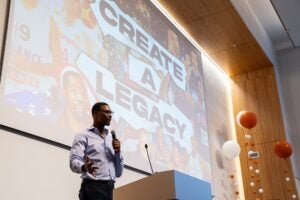
For the book lovers among us, summer means making a little extra time to fall in love with a new title or revisit an old favorite.
Incoming University of Texas at Austin freshmen are no exception, and the 12th annual Reading Round-up invites them to join a campus-wide book club that promises an introduction to the university they won’t soon forget. Not to mention it offers plenty of new entries for their must-read lists.
Reading Round-up shares professors’ picks for books they think new college students should read, from the classics to modern novels to practical nonfiction. Students in the Class of 2018 pick a book from the list, sign up online and read it before the fall semester begins. On Aug. 26, the day before classes start, faculty will lead small group discussions with the students who read their pick. (See the entire list here.)
Educational psychology professor Leslie Moore led a discussion on the novel “A Thousand Splendid Suns” last year and will do so again this summer.
“Having the opportunity to share this experience with curious, knowledgeable and prepared students is one of the privileges of academia,” says Moore. “I had students with a variety of majors and backgrounds from engineering to education which added to the breadth of the discussion. If these students are representative of our future, UT is in great shape!”
Whether you’re about to begin college or your campus days are long in the past, peruse the list and get to know a good book or two.

A Mountain of Crumbs: A Memoir
by Elena Gorokhova
Professor Christopher Long, Architecture
Elena Gorokhova’s “A Mountain of Crumbs” is a lyrical and moving memoir of a young girl growing up in the Soviet Union in the 1960s and 1970s. It is an extraordinary document, by turns revealing of the Soviet reality of the time, ardent, and funny. Gorokhova’s English is smart, limpid, and beguiling: she is a splendid writer. Her book is a very good read and a remarkable portrait of a place and time now all but faded from view.

A Thousand Splendid Suns
by Khaled Hosseini
Professor Leslie Moore, Educational Psychology
An engrossing story of the fate and friendship of two women in modern Afghanistan. I chose this book because in our global society, it gives a personal face to a country that is now part of U.S. history. While reading about the hardships in the lives of men and women in Afghanistan, I learned about how important creating meaning in life is to people everywhere. This book starts as a slow read, but hang in there: it quickly becomes a page turner.

All Quiet on the Western Front
by Erich Maria Remarque
Professor Alan K Cline, Computer Sciences
This year marks the 100th anniversary of the opening of the First World War. It is time to take lessons from that period’s effects on the youth of the time. The hero of “All Quiet on the Western Front” is a 19-year old young man initially led more by the pressures of associates and society than by his own judgement. Through the story and in addition to the horrors of war, he faces questions of identity, loyalty, innocence and sacrifice, just as many people of his age including university freshmen.

Beautiful Boy: A Father’s Journey Through His Son’s Addiction
by David Sheff
Professor Lori Holleran Steiker, Social Work
This #1 New York Times bestseller depicts a family’s experience with addiction, covering a substantial portion of the author’s son’s life and the struggles to live with, help and understand a person with a substance use disorder. Elegantly weaving an emotional narrative with evidence-based science, this acclaimed memoir is an excellent vehicle to understanding addiction and recovery, and learning more about yourself in the process.

Cutting for Stone
by Abraham Verghese
Professor Pauline Strong, Anthropology
Marion and Shiva Stone are twin brothers, orphaned at birth by their mother’s death and their father’s disappearance. They grow up on the grounds of a small hospital in Ethiopia, under the care of a surrogate family operating within the constantly shifting turmoil of a country on the very brink of revolution. The novel deftly weaves detailed surgical descriptions with themes of love, betrayal, faith, humor and coming of age. Like the author, who is a leading figure in the medical humanities and a practicing doctor, the novel’s well-developed characters share his fascination with medicine.

How to Create a Mind: The Secret of Human Thought Revealed
by Ray Kurzweil
Professor David Laude, Chemistry
Kurzweil is the preeminent popular futurist of our time, with books like “The Singularity is Near” and “Age of Spiritual Machines.” In this new book he talks about reverse engineering the brain to figure out how it works and what the nature of intelligence is. Whether you come from the biological side or the artificial intelligence side, this book provides a provocative foray into how mankind will ultimately unlock and harness the extraordinary potential of the brain as we turn it lose on creating artificial consciousness.

Life’s Greatest Lessons: Things That Matter
by Hal Urban
Professor David Fowler, Civil, Architectural, and Environmental Engineering
In this wise, wonderful book award-winning teacher Hal Urban presents 20 principles that are as deeply rooted in common sense as they are in compassion. The topics, gathered from a lifetime of teaching both children and adults, span a wide range of readily understood concepts, including attitudes about money, success and the importance of having fun. Classic in its simplicity and enduring in its appeal, “Life’s Greatest Lessons” will help you find the best in others and in yourself.

Oedipus the King
by Sophocles
Oedipus was written in 5th Century b.c.e. Athens. Fulfilling a prophecy of the Oracle at Delphi, Oedipus kills his father and marries his mother and then becomes King of Thebes. Later, he investigates the cause of a plague in Thebes, only to find that it is he and his sin. The play raises issues of free will, humanism and the role of the gods.

The Elegance of the Hedgehog
by Muriel Barbery
Professor Elizabeth Pomeroy, Social Work
Paloma is a 12-year-old girl who sees no reason to live. Renee, the story’s narrator, is a 54-year-old single woman who manages the apartment complex where Paloma’s dysfunctional family resides. Renee lives vicariously through the characters in the novels she cherishes. As they lead their parallel lives, Paloma and Renee develop a relationship that is full of humor and sadness; joy and hope; as well as grief and loss. There are cats and goldfish and a rich Japanese tenant. This novel is a richly rewarding experience about the meaning of life and death and hope. Once you start, you won’t be able to put his novel down.

12 Years A Slave
by Solomon Northup
Professor John Gonzalez, English
Perhaps the best written of all the slave narratives, “12 Years a Slave” is a harrowing memoir about one of the darkest periods in American history. It recounts how Solomon Northup, born a free man in New York, was lured to Washington, D.C. in 1841 with the promise of fast money, then drugged and beaten and sold into slavery. He spent the next 12 years of his life in captivity on a Louisiana cotton plantation. After his rescue, Northup published this exceptionally vivid and detailed account of slave life. It became an immediate bestseller and today is recognized for its unusual insight and eloquence as one of the very few portraits of American slavery produced by someone as educated as Solomon Northup, or by someone with the dual perspective of having been both a free man and a slave.
See the complete list of faculty-recommended books.
Surfing, Merle Haggard and Killer Summer Road Trips
Recommended titles for summer published by the University of Texas Press

Surf Texas
by Kenny Braun
If you can’t go to the beach, bring the beach to you. Texas is one of the top surfing states in America, and Braun has devoted years to photographing the scene from Galveston to South Padre. Large format, pristine black and white photographs make this a perfectly calm book for a lazy summer day.
Two Prospectors: The Letters of Sam Shepard and Johnny Dark
edited by Chad Hammett
The closest thing we’ll ever get to an autobiography of Shepard, this collection of letters spans 40 years of friendship, turmoil, failure, fame and family. With equal parts hollywood gossip, tortured artist and genuine remorse, the book is an intimate glimpse of America’s leading dramatist.
Aransas: A Novel
Jacob’s Well: A Novel
by Stephen Harrigan
“Jacob’s Well” and “Aransas,” Stephen Harrigan’s first two novels, have been unavailable for far too long. From the beaches of south Texas to the aquifers of central Texas, these two novels are a perfect way to escape to the waters of the Lone Star state, while never leaving your living room. Harrigan is a Texas icon, and these two novels are must-reads for anyone who calls this state home.
Merle Haggard: The Running Kind
by David Cantwell
Haggard continues to tour, even making three stops in Texas this summer, and this book is the most focused study of the artist’s most prolific years available. An American music legend, Haggard’s complex and contradictory career are presented by longtime music critic Cantwell in his famously straightforward and readable style.
Killer on the Road: Violence and the American Interstate
by Ginger Strand
New York Times best-selling author Ginger Strand writes the books that you never knew you wanted to read, but can’t imagine how you lived your life before you read them. In “Killer on the Road,” Strand tells the remarkable story of the American highway system, the planet’s largest public work and the killers who use the system to perform their dark deeds. A perfect companion on those long summer road trips.
Share this story on Twitter:
Read any good books lately? Get the list of books UT professors think new students should read: http://t.co/sRqettvWgG
— UT Austin (@UTAustin) August 26, 2014



